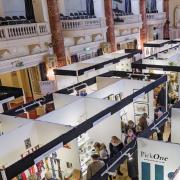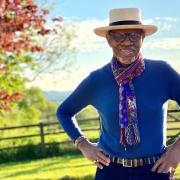Walk down any high street and you’ll soon pass someone wearing Superdry, but no one wears it better than founder Julian Dunkerton

It’s a globally recognised brand and despite the uber cool Japanese graphics logo, it’s born out of Cheltenham. So with profits rising spectacularly when many other retailers are struggling, why isn’t Superdry’s founder and brand director Julian Dunkerton swigging vintage champagne at a Mustique hideaway? Because this passionate retailer isn’t about to relinquish his ambitions for worldwide success with a brand as close to his heart now as when he and co-founder and head of design, James Holder, launched Superdry from Cheltenham in 2003.
Having launched into China last autumn, Superdry continues to drive its penetration across Europe (a 20,000 sq ft store in Cologne opened before Christmas, and a 28,000 sq ft landmark store opens in Berlin this year). In the United States, SuperGroup is further establishing the Superdry brand across the land of the free.
With 2014 retail revenues up 17% (and Group revenue up 12.9% to £487 million), there’s still much to go for. Talking to me at the company’s head office, an array of dull industrial buildings on a Cheltenham trading estate, which hide bright and airy climate-controlled rooms full of designers, film studios and rails and rails of Superdry product, Julian said: “This is a long journey and we’re still at the beginning of it.”
SuperGroup went for a listing on the Stock Exchange in 2010, and the City continues to love it. In 2014 it recruited retail heavyweight Euan Sutherland as the company’s first external CEO. “Bringing in Euan has allowed me to concentrate on growing better and better product while protecting our brand integrity,” says Julian.
Julian is a born retailer. He has an instinctive nose for knowing what’s going to sell. “I’m pretty good at putting myself in someone else’s shoes and understanding their emotional response when they come into one of our stores.”
It’s given him a powerful negotiating position with retail landlords, who turned to Superdry at the height of the economic meltdown in 2004. “When other retailers stopped expanding, I saw our moment of opportunity,” says Julian.
Superdry’s appeal is as strong now as when the company was born out of Julian’s first major retail business, Cult Clothing, in 2003. Early Superdry brand adopters are now 10 years’ older, but still they love and wear it, along with millions of new fans.
“Many retailers lose sight of who they are,” he says. “Egos can get big in this industry and those who found success think they’ve discovered the formula. There is a formula, but you have to keep adapting it. Many don’t.” Superdry’s success is the combination of Julian’s retail savvy and James’ edgy designs.
“James creates all the product, I make sure it’s balanced in an exciting retail environment, that the price points are right and we have enough breadth of colour, size etc. I’ve never met anyone else in this
industry quite like James. We have synergy and the same value system. We are obsessed at being the best.
“You can never, ever, ever say you’ve made it to that nirvana spot. We can always be better and constantly strive to improve.”
Obsessional? Yes, but truly creative entrepreneurs are, and such people are incredibly valuable to the British economy.
Julian Dunkerton was born in London. The family moved to Herefordshire when he was about 14 after his dad, a BBC producer and director, decided to set up a smallholding. Julian went travelling at 18, returning to start a business. He sold it a year later and, brass in pocket, moved to Cheltenham to reprise his early success. He began selling an ‘eclectic’ collection of
clothing in the town’s Regent Arcade shopping centre. “If a product works then another might work next to it. Too many people think in terms of creating a story, but you really need a series of products that work and that becomes its own story.”
After two years, Julian opened his first shop, Cult Clothing, at the top end of the Strand in Cheltenham. “I had some of the highest density retail area in the country for an independent at that time,” he says. “We took £1 million annually on a floor area of around 500 sq ft.”
Cult Clothing soon began opening stores across the UK. “This was before store computerisation and I wanted keep a close eye on my brand. So we began by opening stores within driving distance, shipping out staff from Cheltenham in the morning, and back at night. We’d meet in the pub so we could chat and catch up.”
Despite his control, the strategy wasn’t risk free. “I was personally liable for every store lease in the country. I never saw it as gambling, because I knew I would make money. I understood at that point in my growth a landlord needed my personal security to choose my business over a bigger chain store. That was the only way I could have done it. It would have been more of a gamble to sit with a couple of stores and ride it out. It was about size, ambition and no borrowing. I never went to the bank after visiting them at 19, and getting a straight no. I didn’t want to repeat the experience.”
Cult Clothing sold other people’s brands, including Bench, a brand beloved of teens, designed by Warwickshire born James Holder. “If someone created a fantastic brand, I’d make sure we sold it by putting money behind it, gaining their loyalty by giving them the biggest order they’d ever had,” said Julian.
But in the 1980s, brands were gaining power, leaving independent retailers vulnerable. “We needed to go vertical and I saw a gap in the market,” he added. The future was marrying Julian’s retail and James’ design genius to create their own brand, Superdry.
“I knew that together we could make it work.” Now sold in more than 100 countries worldwide, they have, spectacularly well.
You can take the man out of Cheltenham...
Julian’s loyalty to Cheltenham, the town where he found success, runs deep, but hasn’t he ever thought about moving to London, the epicentre of creative, edgy retail? “As a retail fashion business, it’s important for us to have an outside perspective on the world. Living and working in cities such as London, New York, or Paris – all places I absolutely love, you become absorbed by them.
London is not indicative of the rest of Britain. The age group and earning potential, and therefore the fashion will be different. You have to be conscious of the wider world. We’ve just opened in Bordeaux. If we sold Shoreditch style clothes there, it
wouldn’t work. “Cheltenham is a great town. It’s an interesting and very friendly place to live. I love the architecture too, it reminds me of London. I feel very, very happy and content here.”
As if running a global fashion brand wasn’t enough, a few years ago Julian turned his attention to pubs and hotels. Working with the Lucky Onion Group, he owns hotels including 131 The Prom, pubs including The Tavern, Cheltenham and The Wheatsheaf, Northleach, and he’s recently bought The Wild Duck at Ewen, near Cirencester.
“I’m a bit of a foodie and the portfolio we’ve built up caters for different moods. I’ll visit the Tavern when I’m in one mood, The Wheatsheaf or 131 when I’m in another.”
The team are currently expanding 131 The Prom, which will make the Montpellier area of Cheltenham rival any hotel quarter in any city across Europe. He’s recently taken over the family’s award-winning cider business, Dunkerton Cider and will be moving it to Cheltenham next year. His plan is to regenerate an old industrial site and make it an artisan destination. “It won’t be a Daylesford, but it will be a destination Cheltenham will be proud of.
“I want Cheltenham to be the centre of the Cotswolds in a Londoner’s mind. The countryside suits many people, but there’s so much more to do in Cheltenham.”



























